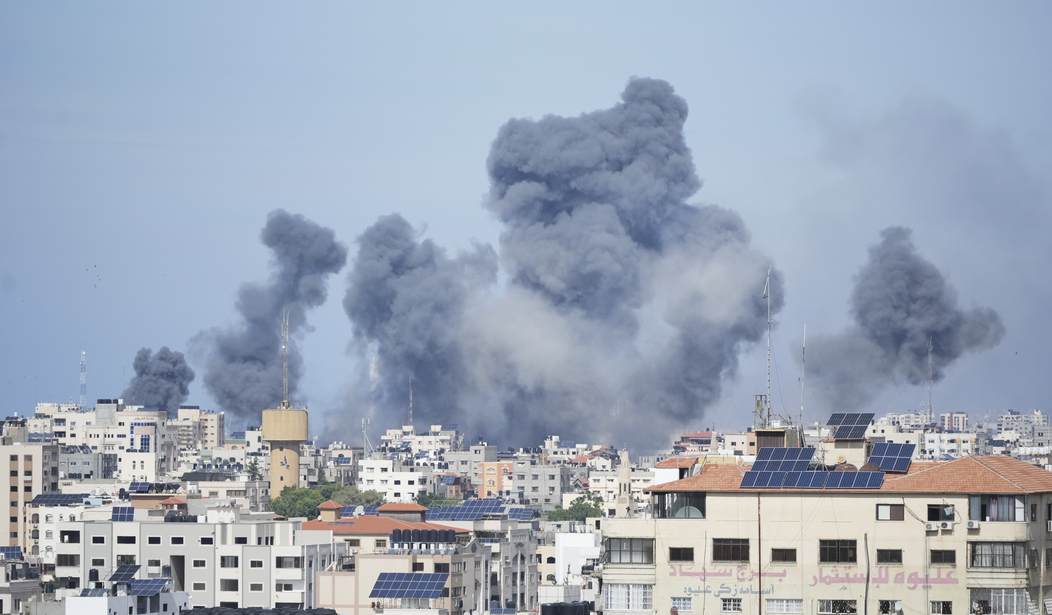As the Israel Defense Forces continue to respond to the barbaric attacks launched by Iran-backed terrorist organizations including Hamas in the Gaza Strip and Hezbollah in Lebanon, IDF also launched a series of strikes inside of Syria in order to limit opportunity for an attack to come from its neighbor bordering Israel's Golan Heights.
According to news outlets in Syria and the country's defense ministry, IDF strikes took out runways at the main airports in Aleppo and Damascus.
Syrian Defense Ministry: At approximately 1:50 pm this afternoon, the Israeli enemy simultaneously carried out an air aggression with bursts of missiles, targeting the international airports of Aleppo and Damascus, which led to damage to the airports’ landing strips and them…
— Joe Truzman (@JoeTruzman) October 12, 2023
That means those airports in western Syria are now unable to serve flights — including, reportedly, a plane carrying Iran's foreign minister.
Damascus International Airport and Aleppo Airport in Western Syria were both Targeted today by the Isreali Air Force resulting in such Serious Damage that the Airports are currently Closed to any and all Flights including a Aircraft from the Iranian Government reportedly carrying… pic.twitter.com/I6aTbt4sgj
— OSINTdefender (@sentdefender) October 12, 2023
According to The Jerusalem Post's report on the Israeli strikes:
During the strikes, an Iranian Mahan Air flight that was about to land in Syria turned back to Tehran. Mahan Air has been shown to transport weapons, operatives, and funds for the Islamic Revolutionary Guards Corps (IRGC) and Hezbollah.
The Damascus International Airport and the Aleppo International Airport are frequently used by Iran to transfer weapons, equipment, and operative to its proxies in the region, including Hezbollah.
Additionally, during the strikes, a plane on which Iranian Foreign Minister Hossein Amir-Abdollahian was in the air heading out of Iran, landing shortly afterward in Baghdad. The foreign minister is reportedly expected to visit Lebanon in the coming days.
Recommended
Mark Dubowitz, the CEO of the Foundation for Defense of Democracies (FDD) noted that, "if these Israeli strikes are aimed only to deny the top diplomat of the world's biggest supporter of state terrorism a place to land, that would appear to be reason enough. Iran is fully behind the Hamas monstrosities and should not be allowed to shuttle around drumming up support for an evil cause," Dubowitz added. "Let Iranian Foreign Minister Amirabdollahian visit Syria by car, if he dares."
As the Jerusalem Post's report noted, Israel's strike successfully removed — for a time at least — one way Iran has been providing support to Hezbollah terrorists who've been engaged in sporadic and escalating attacks against Israel from Lebanon. There's also been at least one launch of projectiles from Syria into Israel as Townhall reported earlier this week.
BREAKING: Israel carried out a barrage of strikes on the Damascus International Airport and the Aleppo International Airport in Syria, Syrian reports alleged on Thursday.#Israel | #Syria https://t.co/R637yMxpGw
— The Jerusalem Post (@Jerusalem_Post) October 12, 2023
The preemptive strike in Syria comes as Israel hopes to head off Iranian prodding for Hezbollah terrorists in Lebanon to fully join Hamas' attacks against Israel. As Enia Krivine — the senior director of the Israel Program at the Foundation for Defense of Democracies — wrote this week of the connections between Iran, Syria, and Hezbollah terrorists:
While Israel contends with Hamas to the south, any escalation in tensions between Israel and Lebanon-based Hezbollah all but guarantees the IDF would be fighting a multifront war against two Iran-backed terror organizations in the coming days and weeks...
Hezbollah is the most formidable, claiming to have 100,000 fighters. While Israel believes the number is significantly lower, many Hezbollah fighters have been battle-hardened over the past decade fighting in Syria. It is also the most heavily armed nonstate actor in the world. Its arsenal of 150,000 rockets in southern Lebanon—most of which are buried under civilian infrastructure—includes hundreds of precision guided missiles (PGM’s) that can hit a target with an accuracy of within 10 meters.
According to Israeli Defense Minister Yoav Gallant, Iran provides $100 million annually to Hamas and $700 million to Hezbollah. Iran has convened Hamas and Hezbollah leaders repeatedly in the past year, resolving to increase cooperation to attack Israel. Given Iran’s huge investment and close ties with the Lebanese terror organization, it is unclear how long Hezbollah can resist Tehran’s call to fully engage in the ongoing war.
FDD Senior Fellow and Director of research further added
























Join the conversation as a VIP Member